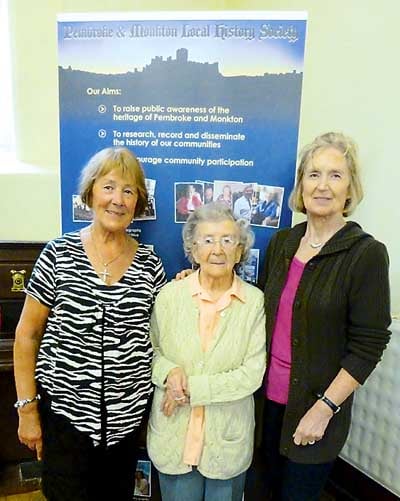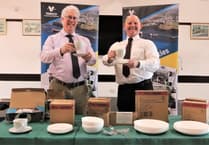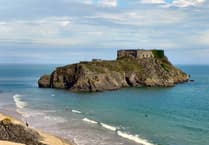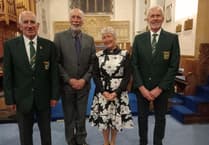Supporting Macmillan
We all have a special interest in Macmillan; Macmillan Cancer Relief is one of the largest British charities and provides specialist health care, information and financial help to people affected by cancer. Pembrokeshire President is Mrs. Dilys Hanmer MBE and a lady for whom I have a great deal of admiration.
"When cancer strikes," she told me, "it affects the whole family. That is why Macmillan's range of services cares not only for the patient but also provides vital back-up for their relatives, including the funding of nurses."
Dilys has worked tirelessly for Macmillan for 45 years.
Asked how she got involved, Dilys told me that she had been a cancer sufferer herself.
"I had an operation in 1971 and wasn't expected to get over it", she said.
But here she is 41 years later, still an active fundraiser at 92, devoting so much of her life to helping others and her story gives real hope to cancer sufferers.
The Pembroke Committee
"My first involvement was with the Carmarthen committee in 1968, then the Narberth committee, where I was chairman for 14 years. We retired to Pembroke in 1988, the town where I was born. When I found that there was no Macmillan committee here, I was asked by the London Office to form one - that was in 1989 and since then the Committee has gone from strength to strength. Macmillan means such a lot to me: you could say it took over my life. It has been one of the most rewarding experiences anyone could have; I enjoy every minute of fundraising and have been rewarded with having a very good Committee to help me."
In the 23 years of its existence, the Pembroke committee raised over half-a-million pounds and, on average, sends £30,000 per year to head office. It was for her exceptional efforts in fundraising that Dilys received the MBE from the Queen.
A Nursing vocation
Turning the clock back, Dilys began her career as a wartime nurse - her first day of training was on September 3, the day war broke out. She was just 18 and it truly was a baptism of fire.
"People have no idea what we went through," Dilys told me.
She lived through bombings in which she lost friends when the nurses' home was hit and had to nurse terrible injuries sustained by the soldiers returning from Dunkirk.
"The nursing of these poor men proved to be a great influence in my training; we worked 12 hour shifts, never complaining."
Dilys continued: "I returned to Pembroke in 1947 to nurse my uncle Bill who lived on the Westgate Hill. At that time, the Cottage Hospital, situated on the East Back, was being supervised by a voluntary committee chaired by Mr. George Wheeler, with Olive Williams, his secretary, and the Gaddams, of Orielton, playing an important part in decision making. This was, of course, before the changeover to the NHS.
"Mr. Wheeler called one evening to seek my help, the matron had gone on holiday unexpectedly and he asked if I would take over until her return. Her return never came and I ended up staying until 1949 when I married and moved away.
"The hospital was small just 16 beds with two wards, male and female, and two private rooms at £5 per week. A portable x-ray was installed for me and a new arc lamp for the little operating room. I also had a dark room at the back for developing my x-ray plates. Useful work was done in this small hospital. Fridays always saw Dr. Pennant, of Saundersfoot, arrive to perform tonsillectomies on children: they would recover in the hospital before being sent home, a matter of a few hours."
Asked what she felt about modern nursing, she replied: "My training was so very different. It's a great shame we lost the School of Nursing. It was a strict training but I benefitted from it throughout my life. Standards were high."
The end of a Pembroke landmark
Dilys has many stories to tell of old Pembroke and this is one you will find interesting.
Number 18 Main Street is the distinctive building much photographed in the old picture postcards because of its Victorian canopy. Alas this no longer exists - Dilys told me what happened to it.
"My father was employed in the dockyard at Pembroke Dock. With its closure, we moved away like so many of the Pembroke and Pembroke Dock workers to other large shipyards. Sadly, my mother died when I was 12 years of age, but mother's sister Florence, who had always lived with us, became my much-loved second mother. Her marriage later to uncle Bill Watkins, of Pembroke, meant my return to live with them at 18 Main Street until I left to take up my nursing training in London at St. Mary Abbots.
"It must have been in 1937 or 38 - before I took up my nursing career - that the accident happened one Saturday night. Saturday was a busy night for Haggar's cinema (which was next door) as they had two houses showing. At that time we had a lot of military coming into the area and, from Castlemartin, a huge lorry would arrive dropping the men off at the cinema. This particular night, I'd gone to bed and around 10.30 or 11 pm, we were awoken by a terrible noise of glass shattering ... well we thought war had started! What happened was that the RAF lorry had reversed into two of the five poles holding up the canopy and smashed them in two. They just snapped and the whole thing collapsed.
"We were all down in our nighties and pyjamas and I remember seeing Mr. Frank Roach, who had the outfitters shop, and Mr. Jim Beddoe and Colonel Arthur Beddoe - two old bachelors living opposite. I can still see it vividly; there we all were standing outside - my uncle frantic in his long dressing gown and nightshirt wondering what had happened. So that was the end of this lovely canopy. It was so lovely, but sadly it was never put back in place - war came in 1939 and metal had to be used for the war effort."
Next
Event
Tomorrow (Saturday, October 6), John Brock will be giving an illustrated talk at our coffee morning in Monkton Priory Church Hall at 10.45 am. 'Wartime Carew with some Monkton memories as well'. We also have an exhibition of old photographs. The coffee morning runs from 10.30 am - 1 pm and entry is free.





Comments
This article has no comments yet. Be the first to leave a comment.